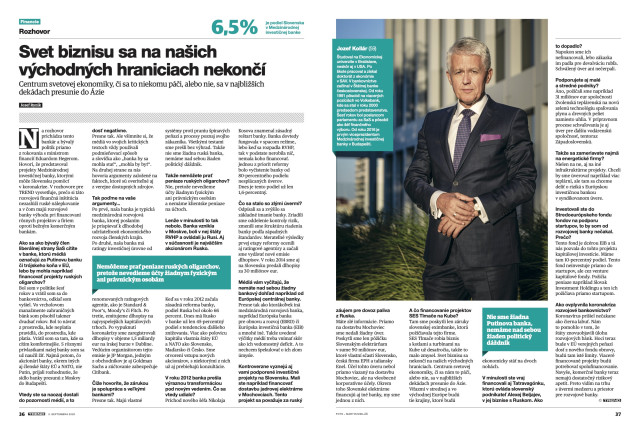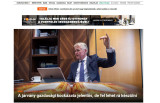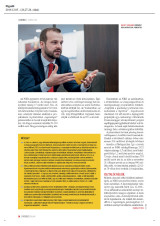"The world of business does not end on our eastern borders" - the First Deputy Chairperson of IIB Management Board Jozef Kollár reflects on the role of multilateral development banks in his interview to Trend.sk
Source: www.trend.sk
The banker came directly to the interview from a meeting with the Minister of Finance. He says he was presenting International Investment Bank projects that could help Slovakia during the coronavirus crisis. In an interview for TREND he explains why this multilateral development financial institution does not deserve to be labelled as Russian and where supranational development banks have an advantage over regular commercial banks in the financing of various projects and enterprises.
As a former member of the liberal SaS party, how does it feel to be at a bank the media have labelled as Russian or Putin’s bank or a Trojan horse in the EU, or that could for example be financing the projects of Russian oligarchs?
I was in politics for six years and have returned to banking – from where I originally left. I was in the top management of foreign banks for almost twenty years. It was a return from an environment where rules do not apply, to one where rules do. I have returned to a place where I feel more comfortable. I have already learned to live with the various epithets of our bank. Especially after the bank shareholders (including EU and NATO member states, not Putin) took the decision to move the bank’s headquarters from Moscow to Budapest. That was when these negative media campaigns began.
At that time you were very much in the media spotlight, and in a rather negative manner
Exactly. However, note that in their criticisms the media always used the conditional and phrases like “the bank could become”, “could be” and so on.
On the other hand, there are arguments in our favour based on hard facts, which are verifiable and, moreover, from publicly accessible sources – in other words “fact based” claims.
So let us go to your arguments
Firstly, our bank is a typical international development bank whose mission is to contribute towards the long-term sustainability of the economic development of its member states. Our founding documents are registered at the UN headquarters in New York. Secondly, our bank has investment level ratings from respected rating agencies like Standard & Poor’s, Moody’s and Fitch, averaging single A. Thirdly, we issue bonds on the most mature capital markets, for example in Britain, Germany and Austria. We registered our first ever MTN program with a volume of EUR 1.5 billion on the Irish exchange in Dublin only after the outbreak of the coronavirus crisis. The leading organiser of this issue is the American investment bank JP Morgan, while one of the traders is Goldman Sachs and the settlement is provided by the American Citibank.
Before commencing trading with you, these banks check you using their own anti-money laundering (AML) services and know your customer (KYC) processes. We passed all these tests without reservations. This means we are not a Russian bank; we have no political umbrella over us. The fact is that we are a standard international financial institution.
So you cannot launder money for Russian oligarchs?
No, because we do not hold accounts for any natural or legal persons and we have no client funds on our accounts. Most importantly, we have implemented the latest compliance standards and procedures within the bank.
Fair enough, yet this was not the case in the past. The bank was established in Moscow, Council for Mutual Economic Assistance states were involved in it, and it was controlled or governed by Russians. Even today, Russia is its largest shareholder.
When the fundamental reform of the bank began in 2012, Russia’s interest was around 66%. Today Russia has only a 45% interest in the bank, and the trend continues to fall. More than half the capital is owned by EU and NATO states such as Slovakia, Hungary and the Czech Republic. This capital interest and the fact that we have transferred the headquarters to Budapest are further evidence that our bank is Europeanising and is open to the entry of new shareholders. I am already involved in consultations with some of them.
In 2012 the bank underwent a significant transformation under new management. What happened at that time?
The arrival of the new Chairperson Mr Nikolay Kosov represented a fundamental restart for the bank. The shareholders approved the reform together with the first Strategy for 2013-2017. Until that time, the bank had operated in something akin to a dormant mode, because when the Council for Mutual Economic Assistance collapsed, it basically had no activity as there was nobody for it to finance. One of the priorities of the reform was to cleanse the bank of the 80% share of non-performing loans on its balance sheet. Today these account for only 1.6%. This is lower than the benchmark in our peer group of similar development banks.
So what became of those bad loans?
They were written off and the capital of the bank was increased. We set up a risk control department and changed the bank management structure along the lines of Western standards. A new corporate governance system was implemented with technical support from the World Bank in Washington DC. The measurable results of the first stage of the reform were also appreciated by the rating agencies, and we began new bond issues. In 2014 we also sold EUR 30 million of bonds in Slovakia.
Who purchases your bonds?
Most often institutional investors such as banks and pension funds, of which we have over 180. We do not sell to retail investors.
They are the main sources of financing for your bank?
Yes. We issue bonds primarily on EU capital markets, so investors clearly trust us. Over the long term, the number of investors has been growing, the average price of funding falling, and the number of states on whose capital markets we issue our bonds expanding.
What yields do you offer on your bonds?
Interest rates are generally around one percent, meaning they are interesting for investors in an era of zero or even negative interest rates on government bonds.
The media also accuse you of not having any banking supervision over you, for example from the European Central Bank.
Exactly, just like any other international development bank, e.g. the European Bank for Reconstruction and Development (EBRD), the European Investment Bank (EIB), the Asian Infrastructure Investment Bank (AIIB), the New Development Bank (NDB), and many others. These accusations from the media should therefore be seen more as their own knowledge deficit. And I do not wish to speculate as to whether they have bad intentions.
Supported projects
The investment projects you support in Slovakia are also linked to controversy. You for example allegedly financed the completion of the nuclear power plant at Mochovce. This project is considered to be of Russian interest because of the imports of fuel from Russia.
Your information is incorrect. We did not directly provide any loan for the completion of Mochovce. We only provided a loan of 90 million to Slovenské elektrárne, which is owned partly by Slovakia, the Czech EPH, and the Italian Enel. The purpose of this loan was not directly connected to the completion of Mochovce, but was for general corporate purposes. In addition, Slovenské elektrárne is also financed by other banks – we are merely one of them.
And what about the financing of SES Tlmače projects in Cuba?
There we only provided guarantees to the Slovak Eximbanka, which provided loans to this company. SES Tlmače has been doing business with boilers and turbines in Cuba for decades, and so supporting it made sense. The world of business does not actually end at our eastern borders. Our bank has the advantage of understanding the business environment to both the east and west of Slovakia. Moreover, today Europe’s largest trading partner is Asia and not North America. Whether we like it or not, in the coming decades the centre of the global economy will shift to Asia. The winners in Central and Eastern Europe will be those states that stand on two legs, economically speaking.
In the past you also reportedly financed Tatravagónka, controlled by the Slovak businessman Alexej Beljajev, in its business with Russia. How did that work out?
We did not actually end up financing it as its contract fell through due to the devaluation of the rouble. They did not even draw the approved loan.
What volume of loans do you provide in Slovakia?
In terms of volume, around EUR 200 million. This is not only direct lending but also the financing of trade and investments in Slovak government bonds, respectively the financing of parties from third countries (Germany for example), the subsidiaries of which operate in Slovakia and employ thousands of people in our country.
Do you also support small and medium-sized enterprises?
Yes. We have lent, for example, EUR 31 million to Zvolenská teplárenská for new green technology for the combustion of gas and wood pellets instead of coal. There is also a loan being prepared for approval for Západoslovenská vodárenská spoločnosť.
So you mainly focus on energy enterprises?
Not only on them – there are other infrastructure projects too. We would like to lend to more heating plants for example, but there we want to split the risk with the European Investment Bank through a syndicated loan.
Do you support research and development in other enterprises?
We do. For example, we will now be participating in a 50-million bond issue for the German Schaeffler, which conducts research and development and supplies bearings to car manufacturers and has subsidiaries in Kysucké Nové Mesto and in Skalica.
You invested in the Central Europe Fund of Funds to support start-ups, something I would not expect from an investment bank. Why?
That fund was created by the EIB, and that invited us into this capital investment project. We have a 10% interest. The fund invests in start-ups, but through venture capital funds, not directly. They lend money for example to Slovak Investment Holding, which then lends directly to start-ups.
Do you also purchase Slovak bonds?
We do. Today we hold government bonds totalling around EUR 30 million. The total turnover since the reform of the bank has been around EUR 150 million.
You also finance various consultation development projects. You supported, for example, assistance for Mongolia in its revision and amendment of its anti-money laundering legislation. This sounds rather exotic...
This was basically technical assistance from a fund we established together with the Slovak Ministry of Finance. It is intended to provide technical assistance to our entrepreneurs who go to do business in Vietnam, Mongolia and so on. This fund hires local experts who teach it the ins and outs of local business and legislation. In this case, Mongolia approached us seeking assistance in building a system to combat money laundering. We used the fund to hire Ernst & Young to provide them with the technical assistance. The project has already ended and was also judged a success by the International Monetary Fund. The latter makes its assistance to developing states conditional on the adoption of standard anti-money laundering legislation (inter alia).
Which sectors and states do you want to lend in going forward?
Our role is to support sustainable economic growth in our member states and the interconnectedness of their economies. Let’s not pretend that there is nobody beyond Čierna nad Tisou. And it is not only Russia – all of Asia is there. We finance, for example, a Hungarian food enterprise that exports ducks to France through to a hydro power plant in Karelia in Russia. This means we have a diversified portfolio of sectors we finance, from energy, agriculture, food production, to research and development.
How is your building of specific national strategies for individual member states going?
The need for and structure of financing differs from state to state and also depends on the structure of their economies. For loans in EU member states we have, for example, lower interest margins than elsewhere in the world. We are also more involved in direct project financing in Europe. In Vietnam, for example, as a rule we provide loans to enterprises through local banks – this is so-called “on-lending”.
Why?
This is because unlike commercial banks, we do not have the distribution channels through which money can flow directly to enterprises. We also do not have the capacity to evaluate the credit risk of every small enterprise. Local banks do, and they are happy to work with us on joint projects
Economics during the coronavirus
How has the coronavirus crisis impacted development banking?
The coronavirus arrived out of the blue like a black swan. It has actually helped us in the sense that states have rediscovered the role of development banks. Although there will be enough public money in the EU from the new recovery fund, there will still be limits. Many financed projects will be needing co-financing. In addition, commercial banks currently do not have sufficient risk appetite. So I see a gap on the lending market, and space for development banks.
What advantages do development banks have over commercial banks?
Some advantages we have are that we provide loans over several decades, and have cheaper loans than regular commercial banks because we are not a bank primarily focusing on profit or dividends for shareholders. The average amount per loan is between EUR 20 and 25 million, which is lower than other large development banks. This means we can also finance small and medium-sized enterprises, which is without doubt another of our comparative advantages. Finally, development banks focus on the so-called development impact, meaning projects with a longer payback period, green projects, projects with significant social impacts, support for employment in regions and so on.
Frame
Jozef Kollár (59)
He studied at the University of Economics in Bratislava. After graduating, he worked and obtained a doctorate in economics at the Slovak Academy of Sciences. After 1990 he expanded his banking education at the University of Wisconsin (Madison) and Oklahoma City University in the USA. He began his banking career at the State Bank of Czechoslovakia. He held various positions at the Austrian Volksbank from 1991, being appointed chairman of the board in 2000. He was a member of parliament for the SaS party six years from 2010. Budget debt brake legislation was adopted during his tenure as head of the Finance Committee. Since 2016 he has been the first vice-president of the International Investment Bank in Budapest.


